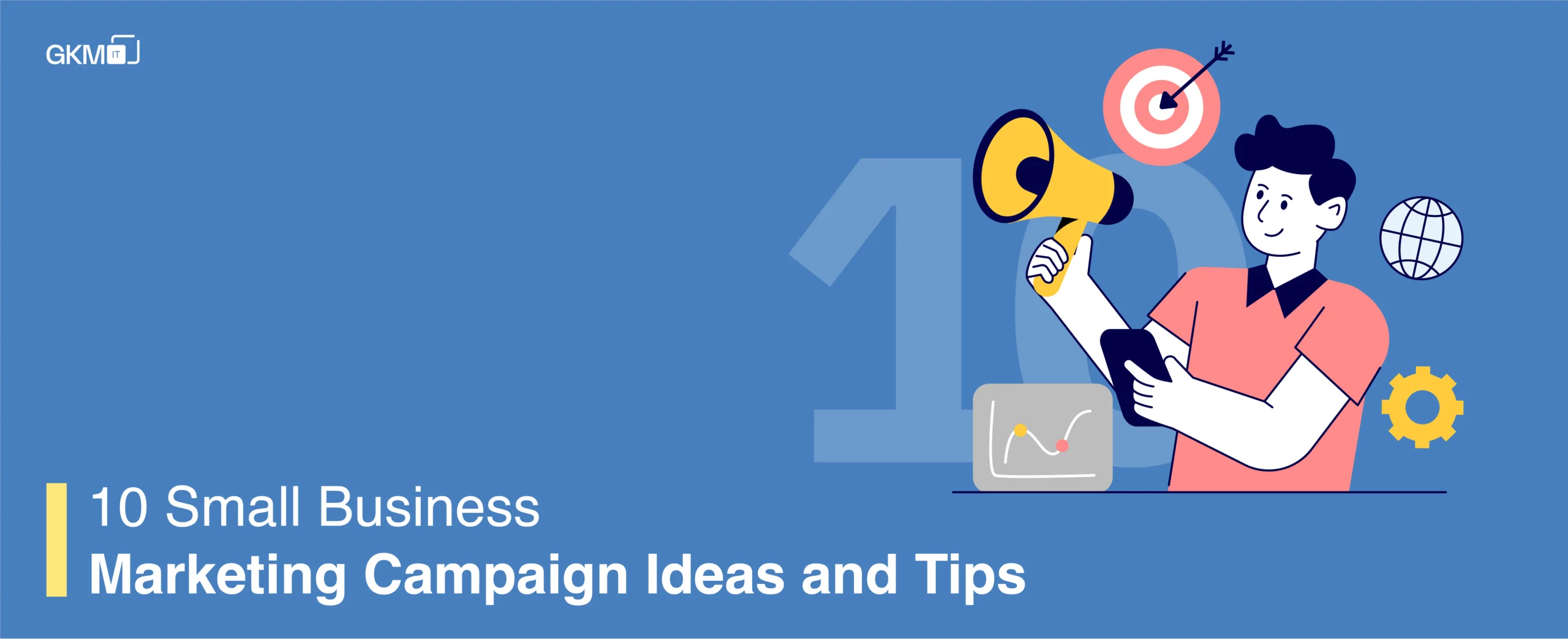
10 Small Business Marketing Campaign Ideas and Tips
Small business marketing campaigns are ‘target-marketing’ efforts to grow small businesses. These campaigns use a variety of tactics, such as email, social media, influencers, content, referrals, SEO, PPC advertising, print ads, events, and public relations, to reach and engage the target audience, resulting in lead generation and an increase in sales. These campaigns are cost-effective and tailored to the specific needs and goals of the small business.
How to analyze small business marketing campaigns?

It is crucial to look at the qualitative and quantitative data of a small business marketing campaign. This analysis includes audience reach and engagement, conversion rate, ROI, competitor analysis, and feedback. This data analysis is vital to make informed decisions and optimize future campaigns to improve the return on investment.
It’s important to note that small business campaign analysis is specific to the business and its goals. Hence, it’s essential to have clear objectives, track and measure the right metrics, and use data analysis to improve and optimise your campaigns. Let’s move forward to different marketing campaigns you can use for your small business.
Different ideas for your marketing campaign

The following are ten small business marketing campaign ideas that will help boost your business:
1. Email Marketing
Email is one of the most cost-effective ways to reach your customers and keep them informed about your business. You can use email to send out promotions, upcoming events, and other important information related to your product or service. Make sure you segment your email list to ensure the right message reaches the right people. Also, email marketing platforms such as MailChimp or Constant Contact can help you create and send your campaigns accordingly. Personalizing your email by using the recipient’s name and addressing them directly by their name gives a very personal touch. Make sure your email is mobile-optimized and has a clear call to action.
2. Social Media Marketing
Platforms like Facebook, Twitter, and Instagram are great ways to connect with customers and promote your business. They are great platforms for posting updates, sharing pictures and videos, and engaging with followers. You can optimise Instagram’s stories feature or Facebook live feature to show behind the scenes of your business or host Q&A sessions. Feel free to get creative with your social media campaigns, whether running a contest or creating a unique hashtag. Use social media analytics to track the performance of your campaign and adjust your strategy accordingly.
3. Influencer Marketing
Influencer marketing involves partnering with someone with many social media followers to promote your business. This marketing can effectively reach new customers, as people trust recommendations from influencers they follow. When working with an influencer, you must establish clear goals and metrics to measure the campaign’s success. Look for influencers who align with your brand’s values and have a following that aligns with your target audience.
4. Content Marketing
Content marketing is about creating valuable and informative content that appeals to your target audience. This method can include blog posts, videos, infographics, and more. Content marketing aims to attract and engage potential customers, which will ultimately convert into paying customers. Use a content calendar to plan your content, and make sure you regularly update your content to keep your audience interested and engaged. Use content marketing analytics to track the performance of your campaign and adjust your strategy accordingly.
5. Referral MarketingFF
Referral marketing encourages existing customers to refer their friends and family to your business. This kind of marketing offers incentives such as discounts or rewards for successful referrals. Make sure you track your referral conversions and adjust your referral program as needed. Send personalised thank you notes or give them something as a token of appreciation to show gratitude.
6. SEO
SEO, or search engine optimisation, is optimising your website and its content to help it rank higher in search engine results. This process can increase the visibility of your business, as well as drive more traffic towards your website. Use keyword research tools to identify the most relevant keywords to your company and use them in your website’s content, meta tags, and image tags. Create high-quality, informative content relevant to your target audience and includes your target keywords. Use SEO analytics to track the performance of your campaign and adjust your strategy accordingly.
7. PPC of Pay-Per-Click
PPC, or pay-per-click advertising, is an online advertising method in which you pay each time someone clicks on one of your ads. Platforms like Google AdWords, Bing Ads, and Facebook Ads allow you to create and run PPC campaigns. This campaign method can be a great way to drive the right targeted traffic to your website and generate leads. Use PPC analytics to track the performance of your campaign and adjust your strategy accordingly.
8. Print Advertising
Print advertising may be old, but it is one of the most effective methods to reach customers who may not be online. By placing ads in newspapers, magazines, or local directories, it is likely to be read by your target audience.
Ensure that you mention contact details in your print ads, such as a phone number or website where customers can learn more about your business.
9. Events
Hosting or participating in events is a guaranteed option to connect with potential customers in person. Whether it’s a networking event, a trade show, or a community fair, events are an effective place to get your business in front of people and create a lasting impression. Consider having special promotions, contests or giveaways to drive more traffic to your booth.
10. Public Relations
Public relations is about building relationships with the media and getting your business featured in articles, news stories, and other publications. This option is a great way to increase the visibility of your business and reach new customers. Consider drafting a press release or news story highlighting your business and sending it to rele
vant publications or reporters; try to make it as catchy as possible to get it out of the pile.
Now that you have read the different ideas for running campaigns for your business let’s read further and get to know tips on the same.
Tips for small business marketing campaigns:

Here are some critical tips for creating a successful small business marketing campaign:
- Understand your target audience and tailor your messaging and channels to reach them effectively.
- Define clear goals and measure the success of your campaign to make necessary adjustments.
- Choose the proper marketing channels based on your target audience and goals.
- Use storytelling to build deeper connections with your audience.
- Continuously measure and optimise your campaign for better results.
- Be consistent with your message across all channels.
- Budget resources effectively and prioritise the most effective channels and campaigns.
- Be open to change and adapt as the market evolves and your campaign progresses.
In conclusion of small business marketing campaigns
Small business marketing campaigns require a targeted approach to reach the right audience, clear goals to measure success, and a combination of different marketing channels to promote your business effectively. Using storytelling and measuring, optimizing and being consistent, budgeting resources and being flexible can help improve your campaign results and ultimately drive business growth. If you run a small business or are looking to start one, we at GKM IT will provide you with the right platforms and strategies to help you reach your business goals.
Related Blogs –
How Manufacturing Companies Gain Value From Business Intelligence Platform
Skyrocket Your Brand Awareness With 7 Online Marketing Strategy
Plants In Office Shares A Special Connection
What Is Data Analytics How Can We Help You With It